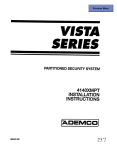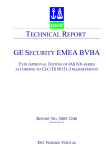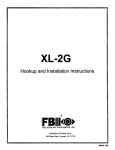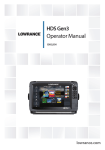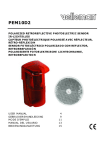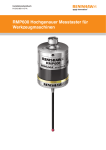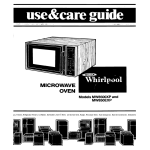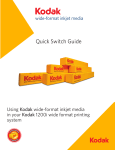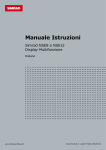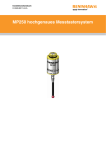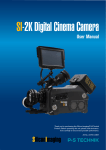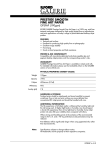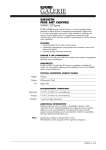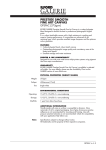Download 2755-829, Enhanced Medium-Speed Scan Head User`s Manual
Transcript
w A ROCKWELL INTERNATIONAL User’s COMPANY Mama/ Bulletin 2755 Enhanced MediumScan Head (Catalog 40062-I 33-01 (A) No. 2755~64FAA, -i4FRA, -L4FCA, -L.4FDA, 2755~L4RAA, -i4RBA, -b4RCA, -L4RDA, 2755~LSRAA, -LSRBA, -LSRCA, -LSRDA) Publication 2755-829 - October, 1989 lmportan t User lnforma tion Solid-state equipment has operational characteristics differing from those of electromechanical equipment. “Application Considerations for Solid-State Controls” (Publication SGI-1.1) describes some important differences between solid-state equipment and hard wired electromechanical devices. Because of this difference, and also because of the wide variety of uses for solid-state equipment, all persons responsible for applying this equipment must satisfy themselves that each intended application of this equipment is acceptable. In no event will Allen-Bradley Company be responsible or liable for indirect or consequential damages resulting from the use or application of this equipment. The examples and diagrams in this manual are included solely for illustrative purposes. Because of the many variables and requirements associated with any particular installation, Allen-Bradley Company cannot assume responsibility or liability for actual use based on the examples and diagrams. No patent liability is assumed by Allen-Bradley Company with respect to use of information, circuits, equipment, or software described in this manual. Reproduction of the contents of this manual, in whole or in part, without written permission of the Allen-Bradley Company is prohibited. Q 1989 Allen-Bradley $25.00 Company Table of Contents Chapter I Tit/e Using this Manual Chapter Objectives ............................... ......................... Overview of This Manual Intended Audience ............................... Warnings and Cautions ........................... Danger and Caution Labels ....................... 2 2-l 2-l 2-3 2-4 2-5 2-5 2-6 How the System Operates Chapter Objectives ............................... How the Scan Head Operates ...................... Positioning Symbols Correctly ..................... 4 l-l l-l l-2 I -2 1-3 Description Chapter Objectives ............................... Overview ....................................... Lens Combinations ............................... Reading Distance ................................ Features ........................................ Cabling ......................................... Accessories ...................................... 3 Page 3-1 3-l 3-1 Installing the Scan Head Chapter Objectives ............................... Warnings and Cautions ........................... Before You Start ................................. ToolsYou Will Need .............................. How to Handle Excessive Noise .................... Grounding Recommendations ..................... Connecting Your Equipment ...................... Determining Space Requirements ................. Installing the Scan Head .......................... How to Install the Swivel Mounting Base ........... Using the Flat Mounting Plate ..................... Installing the Package Detect Assembly ............ 4-1 4-1 4-l 4-2 4-2 4-2 4-2 4-3 4-4 4-4 4-5 4-6 Tab/e of Contents Chapter 5 Page Title Maintenance and Troubleshooting .............................. Chapter Objectives ...................... Maintaining the Equipment Scan Window Removal ........................... Cleaning the Glass Window ....................... Cleaning the Plastic Window ...................... Troubleshooting the System ...................... 6 Specifica Cons Scan Head ...................................... 5-1 5-l 5-l 5-2 5-3 5-4 6-l - Chapter Using This Manual I - Chapter Objectives Overview of This Manual Read this chapter to familiarize yourself with the rest of the manual. You will learn about: l Contents of the manual. l Intended audience. l Warnings and cautions. This manual is for Catalog No. 2755-L4FAA, -L4FBA, -L4FCA, -L4FDA, -L4RAA, -L4RBA, -L4RCA, -L4RDA, -L5RAA, -L5RBA, -L5RCA, and -LSRDA Enhanced Medium-Speed Scan Heads. 1 Chapter 1 I ’ I - I * I I 3 I Title Using This Manual Provides an overview of the manual. Description Features and capabilities are described. How the System Operates I 4 I Installing the Scan Head I 5 I Maintenance and Troubleshooting 6 I Purpose Specifications Glossary Index Bar code operation is Rules and recommendations are detailed. Troubleshooting guidelines are provided. Electrical, mechanical, environmental and operational information is listed. Chapter Intended Audience Warnings and Cautions Using This Manual 1 No special knowledge is needed to read this manual and follow its directions. If the system will be used to communicate with a higher level controller, we assume you are familiar with communication terminology. - Both warnings and cautions are found in this manual and on the equipment. The following symbols are used: A n CAUTION: This laser caution symbol appears where laser radiation is present. WARNING: A warning symbol means people might be injured if the procedures are not followed. CAUTION: A caution symbol is used when machinery could be damaged if the procedures are not followed. 7 0 7 0 _ Chapter - Danger and Caution Labe/s 1 Using This Manual 7-3 The scan head is labeled in accordance with federal regulations. If any label is removed, lost, or becomes illegible, order a replacement from your Allen-Bradley representative. Figure 1.1 shows location of the labels on the scan head. n1 No user maintenance of the scan head is required. Do not open the enclosure! WARNING: l WARNING: Improperly controlling, adjusting, or operating the scan head can result in hazardous radiation exposure. Figure 1 .l Location of Warning and Caution Labels on the Scan Head WARNING I \ HIGH VOLTAGE POWER SUPPLY DISCONNECT POWER AND DISCHARGE ANODE BEFORE SERVICING Chapter 2 Description - Chapter Objectives Overview The capabilities of the scan head are described when connected to a Catalog No. 2755DMl or DM6 Decoder. The Enhanced Medium-Speed Scan Head is a moving beam, bar code scan head capable of scanning symbols up to 50 inches away, when connected to a Catalog No. 2755-DMl or -DM6 Decoder. Scanning is bi-directional at approximately 200 scans per second. Scan heads are available in 3 different configurations: l l l Front scanning (Catalog No. 2755-L4FxA*) Side scanning (Catalog No. 2’755-L4RxA*) Raster scanning (Catalog No. 2755-L5RxA*) * The x stands for one of 4 different range selections, The range selections, A through D, are illustrated in Figure 2.1 - The front scaltlting model allows the beam to exit through the front of the scan head. The side scalznirtg model uses an additional mirror to reflect the beam out the side of the scan head. The raster scanning model uses a mirror, oscillating at 20H2, to project what appears to be a number of parallel beams. This type of scan head is useful when attempting to scan poor quality or misaligned labels. Chapter 3 explains how to correctly position labels and illustrates a raster pattern (figure 3.6) created by a raster scan head. Figure 2.1 illustrates the average reading ranges, relative to the symbol’s minimum bar width, that you should expect when using a Catalog No. 2755-DMl or DM6 Decoder. Not all symbols or applications are perfect, so, slight variations in the the reading distances will occur. Chapter 2 Description Overview (continued) Figure 2.1 Average Scan Range vs. Minimum Bar Width Minimum Bar Width (mils) ...... .:............ 5 10 15 20 25 30 . ........... 35 Scan Range (inches from scan window) 0 0 @ . .......... . ............ 40 45 50 @@ @ Distances WIII be reduced by 10% on all side scanning models (2755-L4R, -LSR) Scan Range will vary with symbol quality. This appllcatlon was based on no more than 30” pitch and 20” skew. For applications outslde of the designated areas, and for applications using a 2755-DMl to decode UPC or Code 128 labels, consult the factory. Chapter 2 Description 2-3 - Lens C2 mbina tions Table 2.A compares the minimum bar width to the scan range of each catalog number. ‘able 2.A 755-L4 Catalog Number identification Minimum Bar Width 7.5 mil 10mil 20 mil Scan Ran e (inches)@@ 83 @ 6.5-8.5 6 -9 5- 12 Front Scanning Side Scanning Raster Scanning 2755-L4FAA 2755-L4RAA 2755-L5RAA 11 mil 20 mil 25 mil lo- 16 8- 19 6-21 2755-L4FBA 2755-L4RBA 2755-L5RBA 20 mil 35 mil 15-32 15-50 2755-L4FCA 2755-L4RCA 2755-L5RCA 50 mil 15-50 17mil 25 mil 35 mil lo-24 8-27 6-33 2755-L4FDA 2755-L4RDA 2755-L5RDA 0 0 0 0 Distances will be reduced by 10% on all side scanning models (2755-L4R, -LSR) Thrsapplrcatron gurde was based on no more Scan Range will vary with symbol quality than 30” pitch and 20” skew. For applications outside of the designated areas, and for applrcatlons usrng a 2755-DMl to decode UPC or Code 128 labels, consult the factory. Symbol lengths greater than one half the usable beam width range. will restrict the near Chapter 2 Description 2-4 Reading Distance Figure 2.2 shows the size and shape of the scanning window. The black area is a no read area. - The Usable Beam Length (bottom of chart) is compared to the the Reading Distance (top of chart). The Usable Beam Length is slightly less than the total beam length. The reading distance is measured from the scan window to the center of the label. Figure 2.2 Reading Distance vs. Usable Beam Length Catalog No 2755- L4F, - L4R Reading Distance@ @ 0" 5" 10" 15" 20" 25" 30" 35" 40" 45" 50". . . . . . . . . . . . . . . . . . . . . . . . . . . . . : : . * . * . . . . . Usable Beam Length . . . . . . . . : . . . . . . . . . . . . . . . . . . . 1 . . . . . . - : . . . : I NA 6'90" 14" 18" 22" 27" 31" 35" 39" 43" Usable Beam Length Catalog No 2755-LSR Reading Distance @@ 0" 5" 10n 15" 20" 25" 3088 3588 40" 45" 50" . . . . . . . . . . . . : . . . . . . . . . . . . . . . . . . . . . . . . . . ’ . . . I Usable Beam length . . . . . . . . . . . . . . . . . . . . . . . . . NA . . . . . . . . . . I . 5" 8" II" 14" 18" 21" 24" 27" 31" 34" Usable Beam Length o Measured from the scan window o Distances will to the center of bar code symbol be reduced by 10% on all side scanning models (2755-L4R. -L5R) 2 Chapter Description 2-5 Features Shutter control. the laser beam. Rotate this knob to prevent projection of There are two LEDs on the back of the scan head. They are defined in Table 2.B. LED indicators. Table 2.B The LED on the Scanner I Label I PWR ON I VALID READ Meaning I The scan head must be connected to the decoder must be ON before this LED lights. I Flashes momentarily and the decoder after any valid label IS scanned Package Detect Port. Connect the optional Package Detect Assembly (Catalog No. 2755-NPl) to this port to allow the scan head to be turned on only when there is a package present. Figure 2.3 Scan Head Features \ Shutter Control Cabling PWR ON VALID READ Package Detect Port To provide maximum installation and application possibilities, the scan head is housed in a separate enclosure from the decoder. The small size of the scan head allows it to be installed in tight areas. Refer to table 2.C for information necessary to order a cable. Chapter 2 Description 2-6 Several accessories are available to provide installation and operational flexibility, including: Accessories l a l This assembly consists of a photoelectric switch and a reflector. You use the switch to indicate to the Decoder when a package is present. Package detector assembly. Mounting hardware. A swivel ball mounting base and flat mounting plate are available for the scan head to provide installation flexibility. Replaceable Windows. Replaceable glass and plastic windows are available. Table 2.C lists system accessories. Ta bie 2.C Accessories Available for the Scan Head Catalog Description Item Number 2755-NPl Package Detector Assembly An infrared photoelectric switch and reflector. “package present” detection. 2755-NC7 Package Detector Port Connector Use to connect user-supplied head For package detector to scan Universal swivel ball mount for greater installation flexibility. 2755NM 1 2755-NM2 2755-NM3 Swivel Mounting “T” Mounting Flat Mounting Base Note: Must be used with “T” Mounting No. 2755NM2). Plate (Catalog Plate Use to mount Swivel Mounting NM 1) to scan head. Base (Catalog No. 2755- Plate Attach this plate to scan head in order to use your own brackets, or to use the Swivel Mounting Base (Catalog No. 2755NM 1) when you want the swivel ball close to the base of the scan head. 2755-Cl I 10-ft Cable 1 Connects Catalog No. 2755-DM 1 Decoder to scan head 2755C2 I 25-ft Cable I Connects Catalog No. 2755-DM 1 Decoder to scan head 2755-CKlO I 104% Cable I Connects Catalog No. 2755-DM6 Decoder to scan head 2755-CK25 I 25ft 1 Connects Catalog No. 2755-DM6 Decoder to scan head W77119-023-010 ( Replacement Window W77119-159-010 Replacement Window Cable 0 I Anti-reflective, optical glass replacement Hard coated, anti-reflective, window Replacement part number window plastic replacement - Chapter Chapter Objectives How the Scan Head Operates 3 How the System Operates Bar code operation is briefly described. The importance of proper symbol positioning and movement is also discussed. Inside the scan head is the laser, the lens and mirror system and the electronics. The laser generates a small, concentrated light beam that is focused and projected through a window. This light is reflected by a label and returned to the scan head for processing. The signal is then sent to the decoder for further processing. Refer to figure 3.1 Figure 3.1 How the Scan Head Operates Video generator board: Video detector Scanner driver Laser enable r --------I Diffusely I reflected ( light from I label (Diffuse Return) 1 I ; i : ------ -,A Positioning the Symbols Correctly As the symbols move past the scan head, they must be correctly oriented. The laser’s line of light must cut through all the bars and spaces in one sweep. Laser’s line of light cuts through the entire symbol Chapter 3 How the System Operates 3-2 Positioning the Symbols Correct/y (continued) For example, if the scan head is mounted so the laser beam is in the vertical direction, then the symbol must also be mounted vertically, commonly known as the Ladder orientation. Figure 3.2 shows a vertically oriented system. - Figure 3.2 Scan Head and Symbol in a Ladder Orientation Scan head is mounted on its narrower side If the scan head is mounted so the beam is in the horizontal direction, the symbol must also be in the horizontal direction. This is termed pi&et fence orientatiort. Refer to figure 3.3 for an example of the scan head and symbol in a pi&et fence orientation. Figure 3.3 Scan Head and Symbol in a Picket Fence Orientation Scan head is mounted on its wider side - Chapter How the System Operates 3 3-3 - Positioning the Symbols Correct/y (continued) When setting up a front or side scanning model, you should attempt to have the laser line of light perpendicular to the bars and spaces of the symbol. For optimal performance, mount the scan head at a 10” to 20” angle off normal from the label, as shown in figure 3.4. Figure 3.4 Proper Mounting of Scan Head Label - The scan head can successfully decode symbols that are up to + 50” out of alignment, provided that the projected, or apparent, bar element widths are within the minimum widths shown in table 2.A. Symbols that are pitched or tilted up to * 45”, are still readable. Skewed symbols can also be read as long as the misalignment is less than * 50”. Figure 3.5 shows a correctly placed symbol as well as misaligned symbols. n t l WARNING: If at any time during operation an intense dot of light is reflected onto a label instead of a line of light, rotate the shutter control knob on the scan head to close the scan window. Then turn the decoder OFF. Chapter 3 How the System Operates 3-4 Positioning the Symbols cOWect/y (continued) Figure 3.5 Examples of Correctly Positioned and Misaligned Symbols Skewed package and symbol Correct/y positioned symbol and package - When setting up a raster scaning model, the pattern created by the raster can overlap the entire symbol, to aid in the scanning of misaligned symbols, or be restricted to cover only a portion of the label, which is helpful when scanning symbols of poor quality. Refer to figure 3.6 Figure 3.6 -Riaster pattern \ Chapter Chapter Objectives Installing the Scan Head 4 Carefully read this chapter before installing the system. We will present rules and recommendations for installing and connecting the scan head. Warnings and Cautions l 1 A l l WARNING: Do not make adjustments to the equipment. Only use procedures specified in this manual. WARNING: If at any time during operation an intense dot of light is generated instead of a thin line of light, immediately close the shutter control on the scan head and remove power. Do not look directly into the laser beam since you could damage your eyes. CAUTION: A A 1 0 1 0 Before YOU Start CAUTION: No user maintenance of the hardware is required. Do not open the unit’s housing! WARNING: Do not open the unit’s housing. No user maintenance of the scan head is required. The angle and distance between the scan head and the labels is an important consideration. These considerations, orientation and alignment, are described in Chapter 3. Chapter 4 installing the ScanHead 4-2 Wi// Need Normally, the only tool you will need for installation is an adjustable, open-ended wrench. If the optional Swivel Mounting Base and Plate are used (Catalog No. 2755NM1 and 2755NM2), you will also need a screwdriver and a 3/l& inch allen wrench. HOW to Hand/e When the system is operating in a noise-polluted industrial environment, special consideration should be given to possible electrical interference. The effect of electrical interference has been minimized by the basic design of the hardware. Properly grounding the equipment, correctly routing wires and the use of shielded cables will also help minimize interference. TOO/S YOU Excessive Noise Grounding Recommendations Grounding is an important safety measure in electrical installations. With solid-state systems, grounding also helps limit the effects of noise due to electromagnetic interference (EMI). An authoritative source on grounding requirements is the National Electrical Code published by the National Fire Protection Association of Boston, Massachusetts. Article 250 of the Code discusses the types and sizes of wire conductors and safe methods of grounding electrical equipment and components. Connecting Your Equipment Connect your equipment using the appropriate cables. Follow the step-by-step procedure described below. Step 1 Connect the scan head to the port labeled SCAN HEAD on the back of the decoder. Step 2 Connect the terminal that will be used for programming to the proper port on the decoder (refer to the User’ Manual supplied with your decoder). Step 3 The initial programming should be done at this time, if it was not done earlier (refer to the User’s Manual supplied with your decoder). - Chapter 4 Installing the Scan Head 4-3 Connecting Your Equipment Step 4 If a host computer will be used, connect it to the port labeled COMM on the back of your Catalog No. 2755-DMl decoder, or the port marked HOST on your Catalog No. 2755-DM6 decoder (refer to the User’s Manual supplied with your decoder). Step 5 If output devices will be used, connect them to the decoder (refer to the User’s Manual supplied with your decoder). Step 6 If a package detector will be used, connect it to the small port on the scan head. (continued) The decoder and scan head are separate units that can be mounted on separate surfaces. A lo- or 25-foot cable is used to connect the two units. Figure 4.1 illustrates the dimensions of the scan head. Determining the Space Requirements Figure 4.1 Mounting Dimensions of the Scan Head -e-m- .+)--------?--I I I I i I Side Scanning Model 2 13" I I All Models f t ;M I 3 75" .75" I 1 I -e-m : T 2 19" : ~ I, 225” 4 Front Scanning Model 1 ---- Location of beam In Scanning Window (A/! Models) Chapter 4 Installing the Scan Head 4-4 Installing the Scan Head Before installing the scan head, review the following information: - Determine the optimum position of the scan head relative to the labels that are to be read. Refer to Chapter 3 for positioning information. If you are using the optional swivel base or brackets, add their dimensions into your positioning calculations. Allow a minimum clearance of 8 inches at the rear of the scan head so you can attach the cables to the various ports. Securely mount the scan head to a rigid surface to ensure proper operation of the scanning mechanism. Because the thickness of the mounting surface (table top, shelf or bracket) determines the length of the screws or bolts required, fasteners are not supplied with the scan head. You will need two IO-32 hexagon-head cap screws, with flat and split washers. Select a length that equals the thickness of the mounting surface, thickness of the washers plus s/8inch (depth of screw holes). HOW to /nsta// the Swivel Mounting Base (Catalog No. 2755-NM I and 2755-NM2) For greater installation flexibility, you can attach the scan head to an optional Swivel Mounting Base. The installation dimensions of the Swivel Base and its associated “T” Mounting Plate are shown in Figure 4.2. - Chapter 4 Installing the Scan Head 4-5 Figure 4.2 Mounting Dimensions of Swivel and “T” Mounting -41.00 r - -r I. n N i /- r 7/G Swivel Mounting - 180 -20 UUF- DIA 2A Base Using the Flat Mountmg P/ate (Ca ta/og No. 2755- NM21 Plate -WI 4 .-I5 I--- l-7'" ' 3. “T” Mounting Plate A Flat Mounting Plate is also available. By attaching this plate to the bottom of your scan head, you can position the swivel mounting ball close to the base of the scan head. You may also use the Flat Mounting Plate when you want to mount the scan head with brackets of your own design. The dimensions are shown in Figure 4.3. Figure 4.3 Mounting Dimensions of the Flat Plate Chapter 4 Installing the Scan Head 4-6 Installing the Packa e Detect Assem Bly (Catalog No. 2755-NM) The Package Detect Assembly consists of: 1. A self-contained photoelectric switch. 2. A 3-inch diameter reflector. The switch has the following specifications: l Maximum operating range: 18 feet. l Operating temperature: -13” to 158” F (-25” to 70” C). l Tolerance to ambient sunlight: 10,000 foot candles. When installing the switch, we recommend you observe the following guidelines: l l l Install the switch at an angle to the labels to minimize the affect of light reflecting off the labels. Install the reflector so it does not exceed its operating range. The package detector beam must be broken before the label is in position to be read. - Figure 4.4 shows a typical package detector installation. Figure 4.4 Recommended Placement of the Package Detect Switch and Reflector. Reflector@ Photoelectric A Scan Head Switch - Chapter 4 Installing the Scan Head 4-7 - Installing the Packa e Detect Assem t?ly Figure 4.5 specifies which pins on the Package Detector Port Connector (Catalog No. 2755NC7) are used. (Catalog No. 2755-NPI) (continued) Figure 4.5 Pins Used on Package Detector Connector + 12v 1 I c Common 2 I t 3 ’ Package Detect Input @ I Package Detect Port on Scan Head 3 If trlggerlng on package detect, with Pin 3 open, no bar code lnformatton IS decoded and the Package Detect LED is OFF. The package detect input must be pulled low In order to decode informatlon. The package detect LED on the Decoder WIII light when the package detect Input IS active. Note: If the laser is programmed to be ON only upon a package detect, the laser will be OFF until the package detector is triggered. - Chapter 5 Chapter Objectives Maintenance procedures are stated and troubleshooting charts are provided in this chapter. Maintaining the Equipment No user maintenance of the scan head is required. Do not open the enclosure! WARNING: t n Scan Window Removal Maintenance and Troubleshooting l The scan window fits into a cut-out in the front or side of the scan head. A gasketed cover is then tightly secured over the window to ensure a Nema 12/13 rating. To remove the scan window: 1. Remove the six Phillips head screws from the cover. ,- 2. Lift the cover away from the scan head. Handle the scan window by the edges to avoid finger prints. Make sure the scan window does not fall out. Refer to figure 5.1 Figure 5.1 Scan Window Chapter 5 Maintenance and Troubleshooting 5-2 Cleaning the Glass Window Do not use abrasive materials, such as disposable paper wipes, to clean the glass scan window. Most disposable wipes, or paper towels, use glass fibers which will scratch and cloud the window. Instead, you may use the following materials: Solvent: Wipe: - Isopropyl alcohol (100% solution). Optics quality lens cleaning paper and cotton-tipped swabs. Use the following procedure to clean the glass: At 0 Do not use abrasive materials, such as disposable paper wipes, to clean the glass scan window. Most disposable wipes, or paper towels, use glass fibers which will scratch and cloud the window. CAUTION: Step 1 Turn the decoder OFF. The switch is located on the rear of the decoder. Step 2 Check that the PWR ON indicators on both the decoder and scan head are OFF. Step 3 Remove the scan window. Figure 5.1 illustrates the removal. Step 4 Use the lens cleaning paper to wipe any dust or foreign material from the window. Be careful not to scratch the window with any grit that might be on the window. Step 5 For stubborn film and finger prints, use isopropyl alcohol (100% solution) and cotton-tipped swabs. To avoid smearing film and fingerprints, rotate the cotton-tipped swab, while it’s on the glass, nearly one revolution then discard it. Step 6 Replace the scan window. Step 7 Turn the decoder ON. The PWR ON indicators on both the decoder and scan head should be ON. Note: When the window is clean, you will barely be able to see the reflection of the laser beam on the clear glass. - Chapter 5 Maintenance and Troubleshooting 5-3 - CIeaning the P/astic Window Do not use abrasive materials, such as disposable paper wipes, to clean the plastic scan window. Most disposable wipes, or paper towels, use glass fibers which will cloud and blur the window, thus reducing the effectiveness of the scan head. Instead, you may use the following materials: Air: Solution: Wipe: Optics rated clean air Optics rated cleaning solution designed for use on plastic coated lenses Optics quality lens cleaning paper designed for use on plastic lenses Use the following procedure to clean the plastic window: t n l CAUTION: Do not use organic solvents on the plastic window. CAUTION: Do not use abrasive materials, such as disposable paper wipes, to clean the scan window. Most disposable wipes, or paper towels, use glass fibers which will scratch and cloud the window. - Step 1 Turn the decoder OFF. The switch is located on the rear of the decoder. Step 2 Check that the PWR ON indicators on both the decoder and scan head are OFF. Step 3 Remove the scan window. Figure 5.1 illustrates the removal. Step 4 Use the optics rated clean air to blow any any dust or foreign material off of the window. Step 5 For stubborn film and finger prints, apply any optics rated cleaning solution designed for plastic lenses. To avoid smearing film and fingerprints you should blot, not rub, the surface of the window. Each time you blot the surface, use a new (dry) section of the optics quality lens cleaning paper. Step 6 Replace the scan window. Step 7 Turn the decoder ON. The PWR ON indicators on both the decoder and scan head should not be ON. Note: When the window is clean, you will barely be able to see the reflection of the laser beam in the window. Chapter 5 Maintenance and Troubleshooting 5-4 Troubleshooting the System Probable Cause Problem )WR ON indicators In both scan head 3nd decoder do not ight. DWR ON indicator on ;can head does not fight, but PWR ON Indicator on decoder 15lit. Decoder is not turned ON. Turn decoder ON. improper connection to power suPPlY* Reconnect power cord to source. Line fuse on decoder is blown. Replace fuse on decoder: Faulty power cord or switch. No incoming power. Check that voltage is present at service outlet. Interconnect cable between decoder and scan head is loose. Reconnect cable and check connections. interconnect Replace cable. cable is damaged. Scan head is damaged Replace scan head Shutter on scan head is closed. Rotate shutter No scan trigger signal. Verify sending of scan trigger by either package detect or host command. No laser beam emitted from window of scan head Improperly Unable to read a label. Laser beam expands and contracts. Warning! Laser beam is an intense dot of light. Possible Solution positioned labels. control knob. Check that reading distance is correct and orientation of labels to scan head is correct. Poor quality labels. Check that labels are good quality and within specifications. Shutter control knob is not fully open. Rotate shutter control knob on Scan head. Decoder is improperly Refer to the appropriate Manual programmed. User’s Loose cables or connections. Check cables and connections. Shutter on scan head is not fully open. Rotate shutter control knob. Scan head is not securely mounted. improve mounting. Laser scanning mechanism is not operating correctly. Rotate shutter control knob in order to close window and then turn decoder OFF. - Chapter 6 Specifications Chapter Objectives Scan Head Electrical Receives power from decoder. (Catalog No. 2755-L) Mechanical Cast aluminum Enclosure LED Indicators l Power On l Valid Read NEMA 12/13 Weight 4lhs(Ukg) Dimensions 10.25” x 4.25” x 2.50” (26.0 x 10.8 x 2.50 cm) Environment Ambient temperature range, 32” to 122°F (0” to 50°C) Meets Class II standards CDRH Standards Optical Light Source Power Fixed Scan Rate Scan sweep angle Focused helium-neon (He-Ne) laser (632.8nm) 1.5 mW max. 200 scans/second, +_ 5% Raster at 20 cycles per second Front scanning unit 47” Side scanning - unit 47” Raster scanning unit 40” 5” to 50” from scan window oo 5” to 50” from scan window oo Scan Range Depth of Field 5” to 50” from normal 0 Label Skew Label Pitch 5” to 45” from normal 0 Package Detect Min. OFF-State Voltage Max. ON-State Voltage 11 VDC 2 VDC 0 Depending 0 Distances will be reduced side scanning models on the model 0 Depending selected on label quality by 10% on all G Glossary A AIM Acronym for Automatic Identification Manufacturers. alignment The relative position of a scanner or light source to the target or the receiving element. alphanumeric or alphameric The character set which contains letters, digits, and other characters such as punctuation marks. aspect ratio The ratio of height to width of a bar code symbol. A code twice as high as wide would have an aspect ratio of 2; a code twice as wide as high would have an aspect ratio of + or 0.5. attended system A Scanner/decoder an operator. combination that must be activated, or attended, by average background reflectance Expressed as a percent, this is the simple arithmetic average of the background reflection reading from at least five different points on a sheet. average edge An imaginary line bisecting the irregularities 8 background The area surrounding of the character edge. a printed symbol. bar The dark element of a printed symbol. bar code The vertical bars and spaces found in a bar code symbol. bar code density The number of characters which can be represented in a lineal inch. bar code label A label that carries a bar code and is sui table to be affixed to an article. bar code reader A device used to identify and read a bar code symbol. Also know as a decoder bar code symbol A group of vertical bars ,that represents a character or group of characters whose spacing is determined by a specific set of rules. In most cases, human readable characters are also printed below the bars. bar length The bar dimension perpendicular to the bar width. G Glossary G-2 bar width The thickness of a bar measured from the edge closest to the symbol’s start character to the trailing edge of the same bar. bi-directional symbol A bar code symbol that can be read in complementary binary code A power-of-two code; each bit position has a weighted (two) directions. value. bit An acronym for Binary Digit. The smallest unit of information in the binary numbering system. Represented by the digits 0 and 1. C CCD Acronym for Charge Couple Device; a linear image sensor that scans at high speeds (approximately 4,000 times per second) and detects the presence or absence of marks passing under the device. character A single group of barsand spaces representing an individual number, letter or punctuation mark. A graphic shape representing a letter, number or symbol. character alignment The vertical or horizontal reference Ii ne. position of characters with respect to a given character density The dimension, in linear inches, required to encode one character. character reading Reading of alpha or numeric characters,and/or means. symbols, by optical character set Those characters available for encoding purposescharacter skew See skew. character spacing The horizontal distance between two adjacent characters. check digit A digit included within a symbol whose value is based mathematically on other characters included in the symbol. It is used to mathematically check the accuracy of the read. clear area A clear space, containing no dark marks, that precedes the start character of a symbol and follows the stop character. That region of a document reserved for OCR characters and the required clear space around these characters. - G Glossary G-3 - code A set of rules governing how the bars and spaces of the symbol will represent characters and groups of characters. bar code. code medium The material used to construct a machine readable code. Such materials may be retroreflective or opaque. code reader or scanner A device that examines a spatial pattern, one part after another, and generates analog or digital signals corresponding to the pattern. contact scanner A code reader that requires physical contact with the code medium. continuous code A bar code or symbol that does not use an intercharacter gap between characters in the code. Code 128 is an example of intercharacter gap. D decoder An unattended device used to decode, or make usable, a diqital or analog signal transmitted from a scanning device. - decoder logic The electronic package which receives the signals from the scanner, interprets the signals into meaningful data and provides the interface to other devices. depth of field The distance between the maximum and minimum symbol can be read. plane where a diffuse reflection Reflection of liqht in all directions. Diffuse reflection glossy surfaces: (Also see specular reflection) occurs from non- dirt In paper, refers to the presence of relatively non-reflective foreign particles imbedded in the sheet. The size and lack of reflectance of the particles may cause the optical scanner to mistake the dirt for inked areas. discrete code A bar code or symbol where the space between characters, intercharacter gap, are not part of the code; as with Code 39. (Also see continuous code) diverging beam A beam of light that is optically controlled different directions from the source. so the light extends in G Glossary G-4 r t EAN Acronym for European Article Numbering System, the international standard bar code for retail food packages. edge error Irregularities with respect to the average edge of an element. element 1) A single binary position in a character. 2) Dimensionally narrowest width in a character, bar or space. the encoded area The total linear dimension consisting of all the characters of a code pattern, including start/stop characters and data. extraneous ink Ink in a scan area not intended to be there. F first read rate The first read rate is the percentage of bar code symbols that are read with the first pass of the bar code wand under ideal conditions. Bar code symbols should have a first read at least 90% of the time. A first read rate of less than 90% usually means that either the bar code symbols or scanning device need some type of adjustment or modification. This does not mean that a system which has a first read rate of less than 90% is unacceptable. zuard bars The bars at the ends and center of a UPC and EAN symbol. They ensure a complete scan of the bar code. H hand held scanner Refers to any scanning device that must be held over the bar code symbol. height-of-scan The maximum vertical scanning dimension of a moving beam scanner at a specific distance from the face of the scanner. helium neon laser The type of laser most commonly used in bar code scanners. Because the laser beam is bright red, bars must not be printed with red ink since they would be indistinguishable from the background. horizontal bar code (Picket Fence) A bar code or symbol presented in such a manner that its overall length dimension is parallel to the horizon. The bars look like a picket fence. I incandescent light source Intense white light used to illuminate camera. an object as it passes under a CCD G Glossary G-5 - intercharacter gap The space between two adjacent bar code characters. white space between two characters in AIM USS-39. For example, the interleaved bar code A bar code in which characters are paired together using bars to represent the first character and spaces to represent the second; as in USS-I 2/5 K key mark or trigger A code bit(s) that provides the scanner with the instruction that the code is in a position to be read; used in some fixed beam readers. f ladder orientation See vertical bar code. laser scanner An optical bar code reading device using a low energy laser light beam as the source of illumination. - Light Emitting Diode (LED) A semiconductor diode generally made from gallium arsenide, that can serve as a near infrared light source when voltage is applied continuously or in pulses. LED’s have extremely long lifetimes when properly operated; being solid-state, they are very resistant to shock and vi bration. light operated Condition in which the control operates when the light beam in uninterrupted. M mis-encodation When the characters which were to be represented in symbol form are not correctly encoded. Example: desired number is 1,2,3,4; the encoded number is 1,2,5,4. misread A condition which occurs when the data output of a reader does not agree with the encoded data presented. See substitution error. module A group of elements-The term module is used by the Uniform Product Code Council in it descriptions of the UPC code. A module is the narrowest unit of measure in the code. A module may be “black” or “white”. Contiguous modules are used to form bars or spaces that are wider than one unit. modulo check digit or character A calculated character within a data field used for error detection. The calculated character is determined by applying a code algorithm to the data field contents. modulus 43 check character Used in Code 39 for data security in addition to the built-in self-checking characters. The check-character is the modulus 43 sum of all of the character values in a given message and is the last character in the code. G Glossary G-6 moving beam scanner A device which dynamically searches for a bar code pattern by sweeping a moving optical beam through a field of view. N nanometer Unit of measure used to define the wavelength of light. 10 -9 meters. no-read, non-read, non-scan The absence of data at the scanner output after an attempted to no code, defective code, scanner fai I ure or operator error. scan due nominal size The standard size for a bar code symbol. Most codes can be used over a range of magnifications from 0.80 to 1.20, nominal. numeric A machine vocabulary that includes only the numbers as contrasted to alphanumeric which includes both letters and numerals. 0 OCR Acronym for Optical Character Reader. An information processing device that scans and decodes human readable OCR symbols. OCR-A An abbreviation commonly appl ied to the character set contained ANSI Standard x3.17- 1974. in OCR-B An abbreviation commonly appl ied to the character set contained ANSI Standard x3.49- 1975. in off-line Refers to devices that operate independently unit. of a central processing on-line An operation in which peripheral devices are connected directly to the computer central processor unit. opacity 1) The property of paper that minimizes the show through of printing from the back side or the next sheet. 2) The ratio of the paper reflectance with a black backing to the paper reflectance with a white backing. scanning range The sum of the scan head’s optical throw and depth-of-field. optical throw The distance from the face of the scanning device to the center of the depth of field. orientation The alignment of bars and spaces to the scanner. Often referred to as vertical (picket fence) or horizontal (ladder). - G Glossary G-7 - overhead The fixed number of characters required for start, stop and checking in a given symbol. For example, a symbol requiring a start/stop and two check characters contains four characters of overhead. To encode three characters of data, seven characters are required. P parallel beam A beam of light that is optically controlled so the light travels in a parallel path. Generally used when the object is larger than the lens diameter. parallel code A code configuration that is optically scanned in its entirety at one time. Since all codes marks are read simultaneously, the code can move pass the reader in either direction. parity bar, parity bit, parity module A parity bit is added to a binary array to make the sum of all the bits always odd or always even; a fundamental check. permanent code A code which is indefinitely reused in a bar code application. picket fence code See horizontal bar code. - pitch 1) Rotation of a code pattern about the X axis. 2) The normal distance between the centerline or adjacent characters. pre-pri nted symbol A symbol which is printed in advance of application on the article to be identified. either on a label or Print Contrast Signal (PCS) A measurement of contrast (brightness difference) between the bars and spaces of a symbol. A minimum PCS value is needed for a symbol to be scannable. PCS = (RL-RD)/ RL, where RLis the reflectance factor of the light background and Rb is the reflectance factor of the dark bars. PCS values can be calculated and displayed automatically on suitable instruments. print quality The complete analysis of a printed symbol with regard to reflectance properties as well as bar and space resolution with regard to symbol specification. The inter-relationship of printed material and imprinted material that affects the optimum performance of the scanner. proximity sensor A method of object detection in which the source and detector are located on the same side; the detector senses energy from the source which is bounce back by the object being detected. Q quiet area, quiet zone See clear area. G Glossary G-8 R raster scanner Also available as an optional raster assembly. Raster scanners are similar to standard scanners. The beam still travels from left to right, but it now does so in a sinusoidal, or top to bottom, pattern. This allows the scanner to see different scan paths so if a bar is deformed or soiled in one place it may still be read due to the sinusoidal sweep of the beam. read A successful scan of a bar code symbol. reflectance The amount of light returned from an illuminated surface. reflectance, absolute The ratio of the total reflectance by a document to the total light incident on the document. reflectance, diffuse Reflected light whose angle of reflection varies from the angle of incidence of the illuminating light; such as reflection from a non-glossy surface. reflectance, specular Reflected light whose angle of reflection is equal, or nearly equal, to the angle of incidence of the illuminating light, as in reflection from a mirror. reflex A method of object detection in which the source and detector are located on the same side; a retroreflector on the far side returns the energy from the source to the detector. reject See no-read, non-read, non-scan. resolution 1) The measure of the ability of a lens, a photographic material or a photographic system to distinguish detail under certain specific conditions. 2) The dimension of the smallest element which can be printed employing a particular technique. 3) The narrowest element dimension which can be distinguished by a particular reading device. retro See retroreflective. retroreflective Characteristic of material causing it to reflect light back to its source regardless of angle of incidence. retroref lector A reflector, specially constructed, which reflects energy back to the source from which it came. It is also known as a “corner reflector”. reverse image A symbol in which the normal dark areas are represented areas. in the light G Glossary G-9 - 5 scan The search for a symbol or marks which are to be optically recognized. scan area The area intended to contain a symbol. scan head, scanner A device that optically scans bar code symbols and converts the optical information into digital or analog form and sends it to a decoder. scanning curtain The effective reading area (width x height) of a moving beam scanner, which is equal to its depth-of-field and height-of scan at a specific operating range. scanning range The combined distance of optical throw and depth of field. scanning wand See wand. segment See element. - self-checking A bar code or symbol using a checking algorithm which can be applied to each character to guard against undetected errors. Non-self-checked codes may employ a check digit or other redundancy in addition to the data message. serial code A bar code symbol typically used with a fixed beam scanner where the scanning action is caused by the motion of the symbol past the scanning head. The bits of the symbol are evaluated one at a time (serially). skew Rotation about the Y axis. Rotational deviation from correct horizontal and vertical orientation may apply to a single character, line or the entire encoded item. space The lighter element of a bar code formed by the background bars. between space encoding See interleaved bar code. special symbol/character In a character set, a character that is neither a numeral, letter, or a blank: for example, @ $ % Q & *. spectral response The variation in sensitivity of a device to light of different wavelengths- specular reflection Reflection of light from a surface at an angle equal but opposite to the angle of incidence. See reflectance, specular. G-IO G Glossary spots Ink or dirt spots within the spaces or clear area of a bar code which may reduce first read rate. 4 start/stop character A bar code character that provides the scanner with start and stop reading instructions as well as code orientation. stepladder code See vertical bar code. substitution error This error can be seen in a mis-encodation, mis-read, or human operator error. Characters are substituted with erroneous information. Example: correct information is 1,2,3,4; substitution is 1,2, 5,4. Substitution errors are usually the result of bar code labels with printing defects. Substitution errors are extremely difficult to determine and are usually not found until the data has been processed and an obvious data error is noti ted. symbol A combination of characters including start/stop characters and check characters, as required, which form a complete scannable entity. symbol density The number of characters per linear inch. symbol length The length of the symbol measured from the beginning of the quiet area adjacent to the start character to the end of the quiet area adjacent to a stop character. - u unattended system A Scanner/decoder combination that is triggered, or activated, by an external source such as a computer, PLC or mechanical switch. UPC Universal Product Code. The standard bar code symbol for retail food packaging in the United States. V vertical bar code (ladder orientation) A code pattern in which the overall coded area from start to stop is perpendicular to the horizon. The individual bars appear as rungs of a ladder. void(s) The absence of ink within printed bars. The absence of ink within the confines of a character. W wand A hand held scanning device used as a contact bar code or OCR reader. 4 Index A accessories . . . . . . . . . . .._.......................... 2-6 alignment . . . . . . . . . . . . . . . . . . . . . . . ..-.-...... 3-l - 3-3 anti-reflective replacement windows . . . . . . . . . . . . . . . 2-6 attaching flatplate . . . . . . . . . . . . . . . . . . . . . . . . . . . . . . . . . . . . . 4-5 scan head . . . . . . . . . . . . . . . . . . . . . . . . . . . . . . . . . -. -. 4-4 swivel ball 4-4 Tmountingpia;e’:::::::::::::::::::::::::::::: 4-5 B bar code . . . . . . . . . . . . . . . . . . . . . . . . . . 2-2 - 2-4,3-l - 3-4, width 2-2 - 2-4,3-3 beamwidth’:::::::::::::::::::::::::::::. 2-4 brackets . . . . . . . . . . . . . . . . . . . . . . . . . . . . . . . . . i:6; 414 - 4-5 c - cabling . . . . . . . . . . . . . . . . . . . . . . . . . . . . . . . . . . . . . . . . . . 2-5 caution . . . . . . . . . . . . . . . . . . . . . . . . . . . . . l-l - l-3,4-1,5-3 charts . . . . . . . . . . . . . . . . . . . . . . . . . . . . . . . . . . . . . . . 2-2,2-4 clearance . . . . . . . . . . . . . . . . . . . . . . . . ..-............. 4-4 code 2-2 - 2-3 COMM”:::::::::::::::::::::::::::::::::::::..... 4-2 configurations . . . . . . . . . . . . . . . . . . . . . . . . . . . . . . 2-2 - 2-4 connections . -. . . . . . . . . . . . . . . . . . . . . . . . . . . . . . . . . . . . 5-4 connector . . . . . . . . . . . . . . . . . . . . . . . . . . . . . . . ..-.. 2-6,4-7 considerations . . . . . . . . . . . . . . . . . . . . . . . . . . . . . . . . . . . 4-l cut-out . . . ..-.................................... 5-l D danger . . . . . . . . . . . . . . . . . . . . . . . . . . . . . . . . . . . . . . . . . . l-3 decode . . . . . . . . . . . . . . . . . . . . . . . . . . . . . 2-2 - 2-3,3-3,4-7 decoder 2-5,3-3,4-2 - 4-3,4-7,5-2 diffusereturn’::::::::::::::::.......... 3-l DMl Decoder(expectations) . . . . . . . . . . . . . :::::““’ 2-l - 2-4 DM6 Decoder (expectations) . . . . . . . . . . . . . . . . . . 2-1 - 2-4 E effectiveness (reduction) EMI . . . . . . . . . . . . . . . . . . . . . . . . . . . . . . . . . . . . . . . . . . . . . enclosure (warning) . . . . . . . . . . . . . . _. . . . . . . . . . . . . . . . - 5-2 4-2 l-3 F front scanning- m1: 1:: 1:: 1: 1: 1:: 1: 1:: 1: 1: 1: fasteners 4-4 *m 2:; Si Y4,4-3 index I-2 G gasketed cover .................................. grit (removal from window) ....................... grounding ....................................... 5-1 5-2 4-2 I illegible labels . . . . . . . . . . . . . . . . . . . . . . . . . . . _. . . . . . - 1-3 installation . . . . . . . . . . . . . . . . . . . . . . 2-5 - 2-6,4-2,4-4‘4-6 intended audience . . . . . . . . . . . . . . . . . . . . . . . . . . . . . . . l-2 interconnect . . . . . . . . . . . . . . . . . _. . . . . . . . . . . . . . . . . . _ 5-4 isopropyl alcohol . . _. . . . . . . . . . . . . . . . . . . . . . . . . . . . . . 5-2 L L4FAA ........................................... L4FBA ........................................ L4FCA ........................................ L4FDA ........................................ L4R L4RAA”:::::::::::::::::::::::::::::::::::::::”l--1,2-2 L4RBA ........................................ L4RCA ........................................ ....................................... L4RDA L5R LSRAA”::::::::::::::::::::::::::::::::::::::. LSRBA ........................................ LSRCA ........................................ L5RDA ....................................... laser ............... l-2,2-5,3-1 LEDs ............................................ 2-2 l-1,2-2 l-l, 2-2 l-l, 2-2 2-4 - 3-2,4-l, l-l, 2-i l-1,2-2 l-1,2-2 2-2 - 2-3 l-l, 2-2 l-1,2-2 l-l, 2-2 l-1,2-2 4-6 - 4-7, 5-2 2-5 M maintenance 5-l - 5-4 minimumbarwib;h”:::::::::::::::::::::::::: 2-2-2-3 misaligned . . . . . . . . . . . . . . . _ . . . . . . . . . . . . . . . . . . 3-3 - 3-4 mounting . . . . . . . . . . . . . . . . . . . . . . . . . . . . . . . 2-6,4-3 - 4-5 N 1-1,6-l nema12 . . . . . . . . . . . . . . . . . . . . . . . . . . . . . . . ..-.... noise-polluted . . . . . . . . . . . . . . . . _. . . . . . . . , . . . . . . . . . 4-2 0 optics . . . . . . . . . . . . . . optimum position . . . orientation ......... oscillating . . . . . . . . . . . . . . . . . . . . . . . . . . . . . . . . . . . 5-2 - 5-3 . . . . . . . . . . . . . . . . . . . . . . . . . . . . . 4-4 . . . . . . . . . . . . . . . . . 3-1 - 3-2,4-l, 5-4 . . . . . . . . . . . . . . . . . . . . . . . . . . . . . 2-l index l-3 - P package detector ............................. picket fence ..................................... positioned .................................... positioning ................................... programmed ............................. PWR .................................... 2-6,4-7 3-2 3-4,5-4 3-1,4-4 4-2,4-7,5-4 2-5,5-2-5-4 R range ............................... 2-l -2-3,4-6,6-l raster raster scanner ...................... 2-1,2-4,3-4,6-l read ....... l-l -1-2,2-4-2-5,3-3,41,4-4,4-6,5-4-6-l reading distance ................................. 2-4 recommendations 4-l 4-2 ............................ reflection .................................... 5-2 - 5-3 replaceable windows ..................... 2-6,5-l - 5-3 restrict near range ................................ 2-3 s - scan head .... 1-1,1-3-2-1,2-5-3-3,4-1-4-5,5-l-5-4 scan range ....................................... 2-3 scan window ................................. 5-1 - 5-3 abrasive materials ............................. 5-2 cleaning 5-2 - 5-3 ................................. removal .................................. 5-l - 5-3 scanning ........................................ 3-4 scanned ......................................... 2-5 scanning ........... 2-1,2-3-2-4,3-1,3-4,4-3 -4-4,5-4 self-contained 4-6 ................................... shielded ......................................... 4-2 shutter ............................... 2-5,3-3,4-l, 5-4 sidescanning 2-l -2-3,3-2 ............................ skew .................................... 2-2 -2-3,6-l skewed labels ................................ 3-3 - 3-4 smearing .................................... 5-2 - 5-3 solvent ...................................... 5-2 - 5-3 specifications ............................ 4-6‘5-4-61 step-by-step procedure 4-2 swab(cotton) . . . . . . . . . . . . . . . . . . . . . . . . . . . 5-2 ......... swivel ball ............................... 2-6,4-4 -4-5 swivel mounting base ................. 2-6,4-2,4-4 - 4-5 symbol ......................... 1-2,2-l - 2-4,3-l - 3-4 index l-4 T terminology . . . . . . . . . . . . . . . . . . . . . . . . . . . . . . . . . . . . . l-2 tolerance . . . . . . . . . . . . . . ..-....................... 4-6 triggered . . . . . . . . . . . . . . . . . . . . . . . . . _ . . . . . . . . . . . . . . 4-7 troubleshooting ............................. 5-1,5-4 u upc ......................................... usable ....................................... user-supplied .................................... 2-2-2-3 2-3-2-4 2-6 W warning . . . . . . . . . . . . . . . . . . . . l-l -l-3,3-3,4-1,5-1,5-4 washers . . . . . . . . . . . . . . . . . . . . . . . . ..-.............. 4-4 width . . . . . . . . . . . . . . . . . . . . . . . . . . . . . . . . . . . 2-2 - 2-3,3-3 window, scan . . . . . . . . . . . . . . . . . . . . . . . . . . . . . 2-6,4-3,5-2 wipes . . . . . . . . . . . . . . . . . . . . . . . . . . . . . . . . . . . . . . . . . . . 5-2 - c ALLEN-BRADLEY m w A ROCKWELL INTERNATIONAL COMPANY With offices in major cities worldwide. WORLDHEADQUARTERSEUROPE/MIDDLE EAST/AFRICA ASIA/PACIFICHEADQUARTERSCANADA HEADOUARTERS LATlNAMERICA 1201South Second Street Milwaukee, WI 53204 USA Tel: (414)3&Z-2000 Telex: 43 11016 FAX:(414)3624444 Publication SALESHEADOUARTERS Allen-BradleyEuropa B.V. Amsterdamseweg 15 1422ACUithoorn The Netherlands Tel: (31)2975/60611 Telex: (844)18042 FAX:(31)2975/60222 2755-829 - October, 1989 Allen-Bradley(HongKong)Limited 2901Great Eagle Center 23 Harbour Road G.P.O.Box9797 Wanchai, Hong Kong Tel: (852)5/739391 Telex: (780)64347 FAX:(852)5/8345162 Allen-BradleyCanada Limited 135Dundas Street Cambridge, OntarroNlR 5X1 Canada Tel: (519)623-1810 Telex: (069)59317 FAX:(519)623-8930 HEADOUARTERS 1201South Second Street Milwaukee,WI 53204USA Tel: (414)382-2000 Telex: 43 11016 FAX:(414)382-2400 40062-I 33-01(A)













































